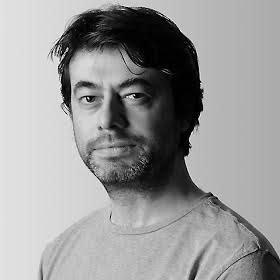“I had no idea that it was being recorded!”: 48 years later, percussionist Ray Cooper tells the story of his ‘lost’ live collaboration with Elton John that's finally getting a release
We speak to the superstar percussionist about “a very brave, very courageous idea that Sir Elton had, to go out on the road with just two people…”
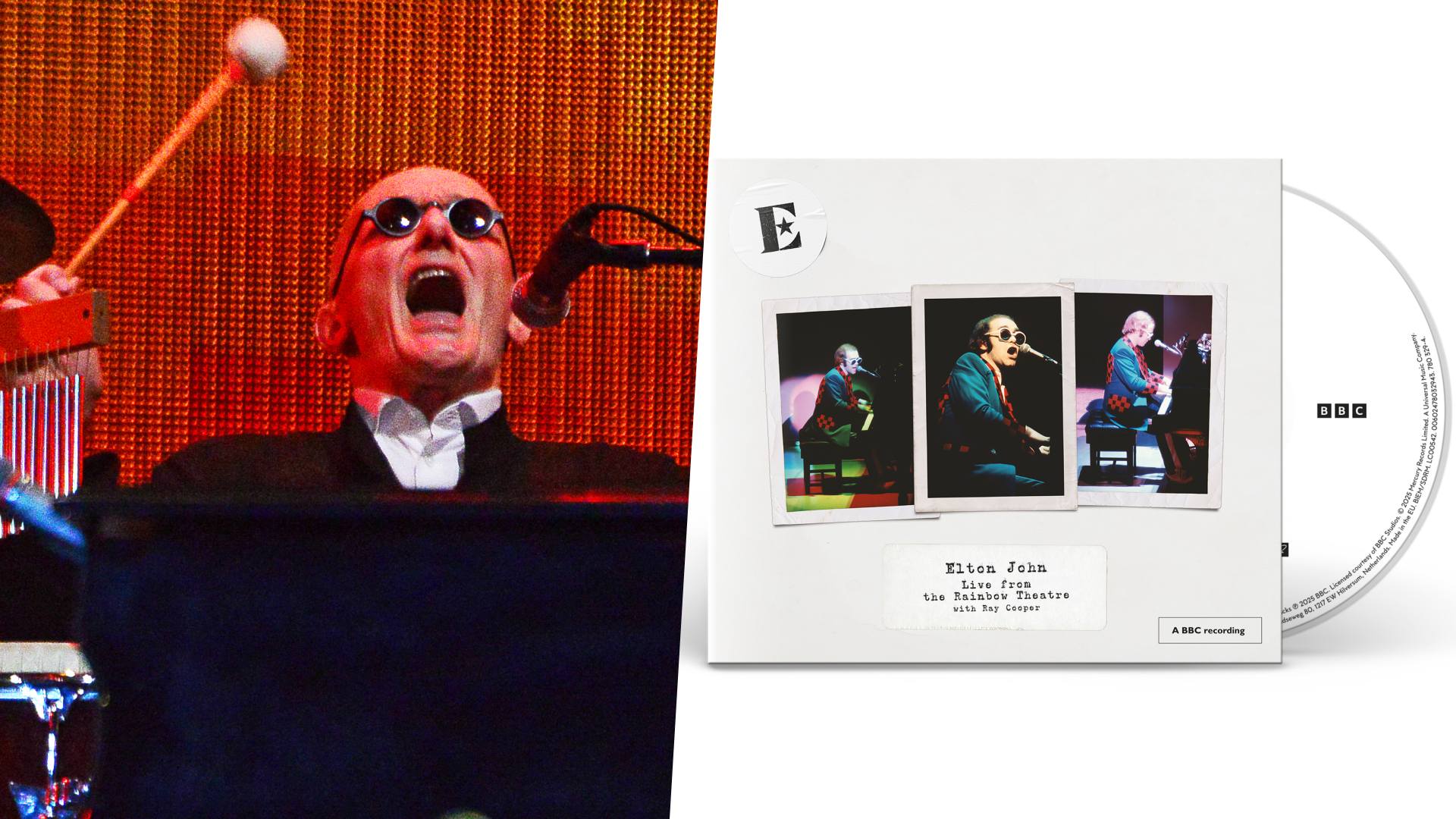
In May 1977, Elton John took the stage at London’s Rainbow Theatre alongside percussionist Ray Cooper for a six-show residency. The shows marked the first time in five years that a full month had passed without an Elton LP or single appearing on the UK charts and saw Elton at the height of his powers.
The gigs were a return to the stage for Elton following his surprise ‘retirement’ from touring the year earlier. Incredibly, he had been averaging one show every four days for the previous seven years.
But this was to be a show unlike any of his others. Appearing alongside only percussion legend Ray Cooper, Elton would ride out the first half of the show completely solo before Cooper would join for part two.
The stripped-back performances have since come to be regarded as some of the finest of his career and earlier this year – following years of bootlegs and illegal recordings – an official recording gained a vinyl release to mark Record Store Day.
Now that audio is getting a wider digital release, being available on streaming and CD for the first time today (25 July).
To find out more about the pair’s ‘lost’ show we caught up with Cooper at home in London to get not only his side of the story, but also to revel in some of the highlights from his prolific career.
At last, Live from the Rainbow Theatre is out, getting a CD and digital release for the first time. You must be pleased about that.
Want all the hottest music and gear news, reviews, deals, features and more, direct to your inbox? Sign up here.
"Well, I'm surprised 'cos I had no idea that it was being recorded! Really, I had no idea. We put the show together – an ingenious, very brave, very courageous idea that Sir Elton had to go out on the road with just two people – and the first gig was for charity with the wonderful Princess Alexandra. And we rehearsed and we got on stage and it happened… And I really had no idea that it was recorded.
"So when it was announced that it was coming out just recently, I was overjoyed. Shocked. I thought, ‘Wow, what a joyous piece of history that’s finally coming to light,’ because it was an iconic moment. That pebble that went into the pond, the ripples went out and a lot of people realised that an artist of the calibre of Sir Elton can change directions, change everything and make things even more magical."
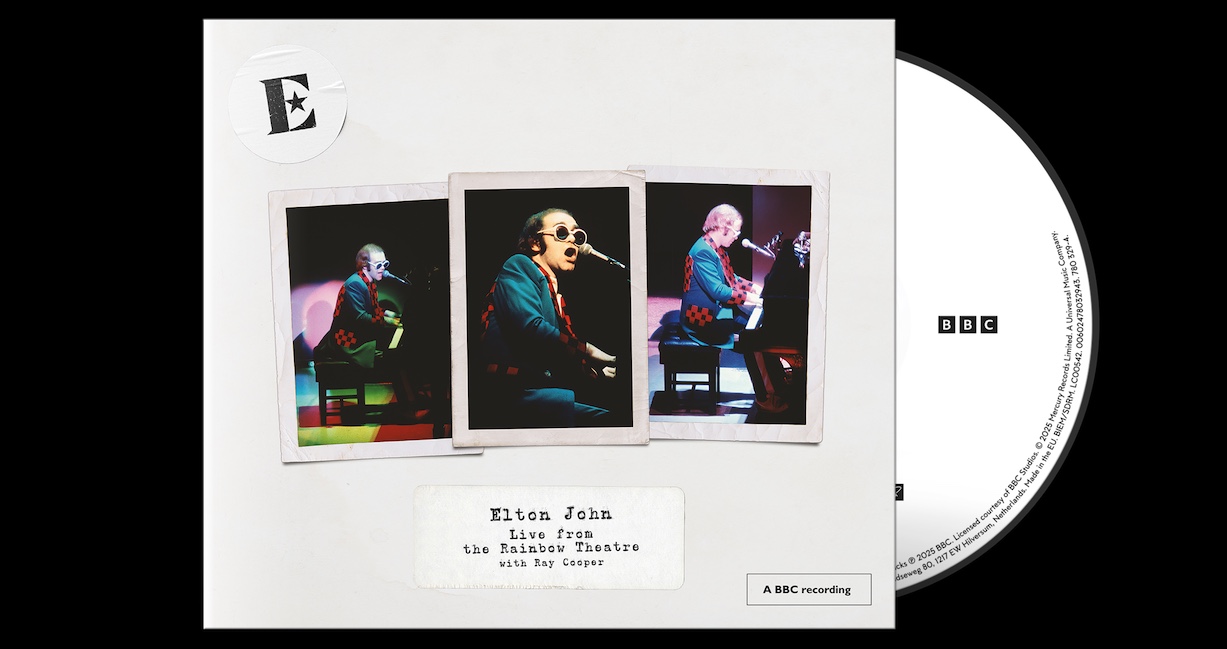
And this is Sir Elton at the peak of his powers, so to perform a completely solo show for the first half and then have you join him for the second… That must have been a surprise for fans.
"Exactly. The phone call was the most extraordinary thing. He’d sort of retired. He did a concert in 1976 at Wembley, where he announced that he was retiring, which was a shock to everybody.
"I’d gone back home to Suffolk and started a life without ‘all that’. Without the wonderful touring and everything else. And then, about 18 months later, the phone rang quite late at night, and it was Elton.
"And it was a joy to hear his voice leaping across the wires, full of enthusiasm. And he said, ‘I want to go back. I want to do some concerts.’ And I said, ‘That's wonderful news. Have you rang the guys?’ And he said, ‘No’… and there was a pregnant pause... and he said, ‘I want to do it just with you.’
"And I paused, and said, ‘Well, first of all, I'm honoured, and what a wonderful idea… But…’ It was a severance of the umbilical cord, if you like. Cut away from the rock and roll, the structure of a band and the guitars and electrics and everything else.
"This was going to be stripped right back to the beauty of his music and Bernie's lyrics with only acoustic instruments and the freshness and the liberation of no structure – just the songs as he wanted to sing them.
"And he had never sung some of them live before. It was freedom for an artist and I was so lucky to be able to help supply that liberation for him."
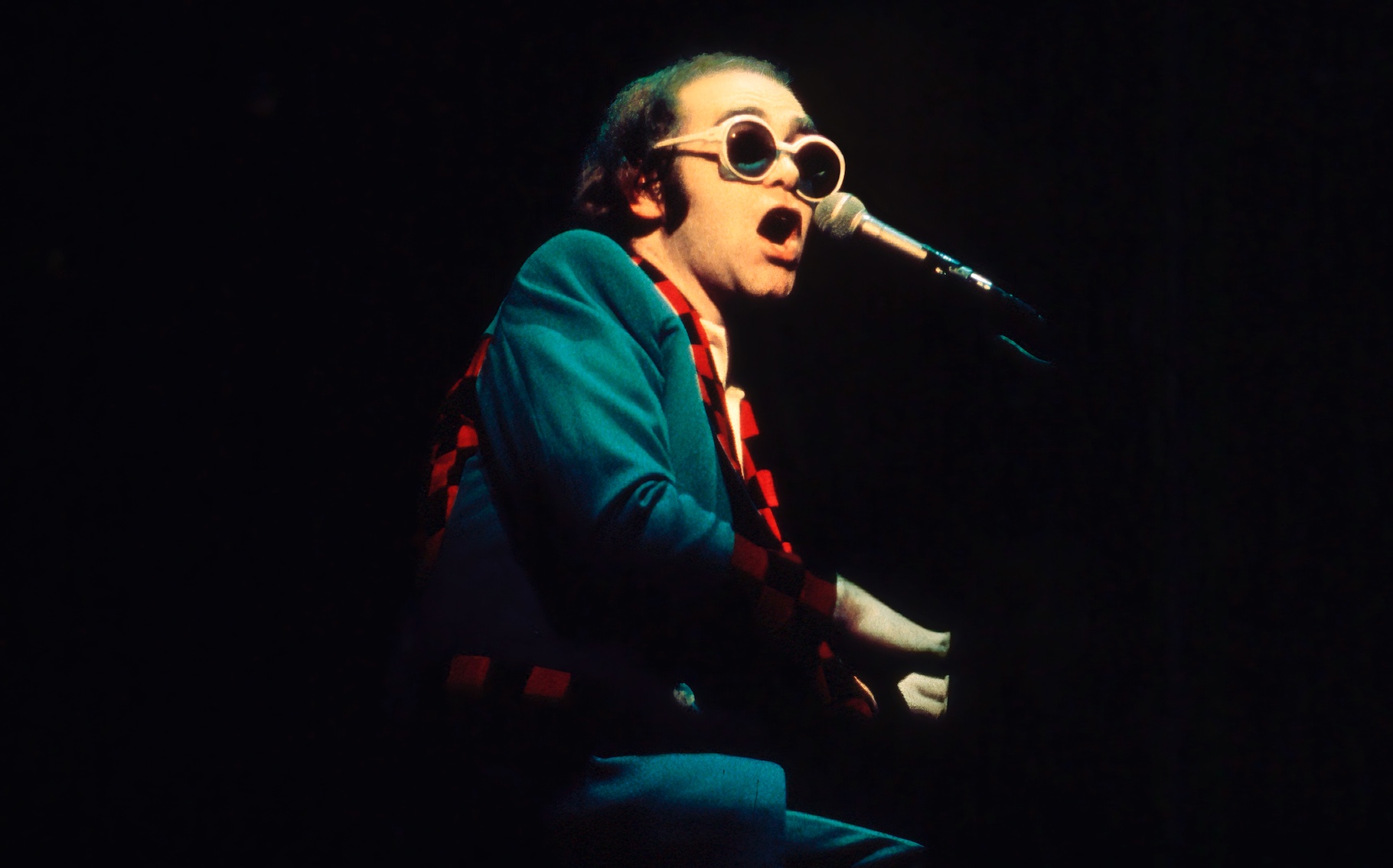
What do you think Sir Elton wanted you to bring to the gig?
"Because I'm a colourist, you know? I just add a bit of structure. I'm a part of the safety net, which is the rhythm section, of course, but also I colour things. I colour words. Because I've got this incredible family called the percussion family – which is the biggest family in the orchestra – I have more instruments to abuse than anybody else!
"So this idea… Suddenly, in those moments, a collaboration in my head appeared, which was absolutely magical, and of course, incredibly brave of him."
And the setlist for the gig, that was quite a brave pick, too.
"It was. Very. He was able to review his own portfolio of beautiful songs. Songs that he didn't think perhaps could be performed on stage with that structure of electrics and guitars and an expectation from the audience. He broke that mould.
"He gave another level for audiences to realise what can happen in a rock and roll venue. And a lot of artists have followed. Without him, a lot of artists wouldn't have been so brave. I think [MTV] Unplugged came out of that. Audiences were going into a rock and roll venue with the expectation to get up and dance, but suddenly you’re in a good seat, and you’re really listening to the music.
"And it was Sir Elton's music as he wanted to play it. And that was a great privilege. I think the audiences understood that, and immediately knew that this was something very special."
And the first half of the show was just Sir Elton, solo…
"And I was always there. I was always at the side of the stage throughout his whole part. I always watched his performance because it was so electric. I didn't know quite what he was going to do next, and that was what was wonderful about it."
And this is a show that went on to do 233 shows. I think people assume that Taylor Swift and Harry Styles invented the mega tour, but you were doing it for real in the 70s.
"And he never stopped, until recently. Because he's a true performer. He loves to perform and he loves to give audiences the joy of his music. And I think a lot of people have said, ‘Well, that's the way it should be done.’ And a lot of people have followed.
"And that's why I think he's interested in giving young people a lot of musical advice. His overwhelming thing is that you must perform. Performing is what it's all about. It's that live thing. You learn from the audience, you learn your craft. You learn everything about what you need to do."
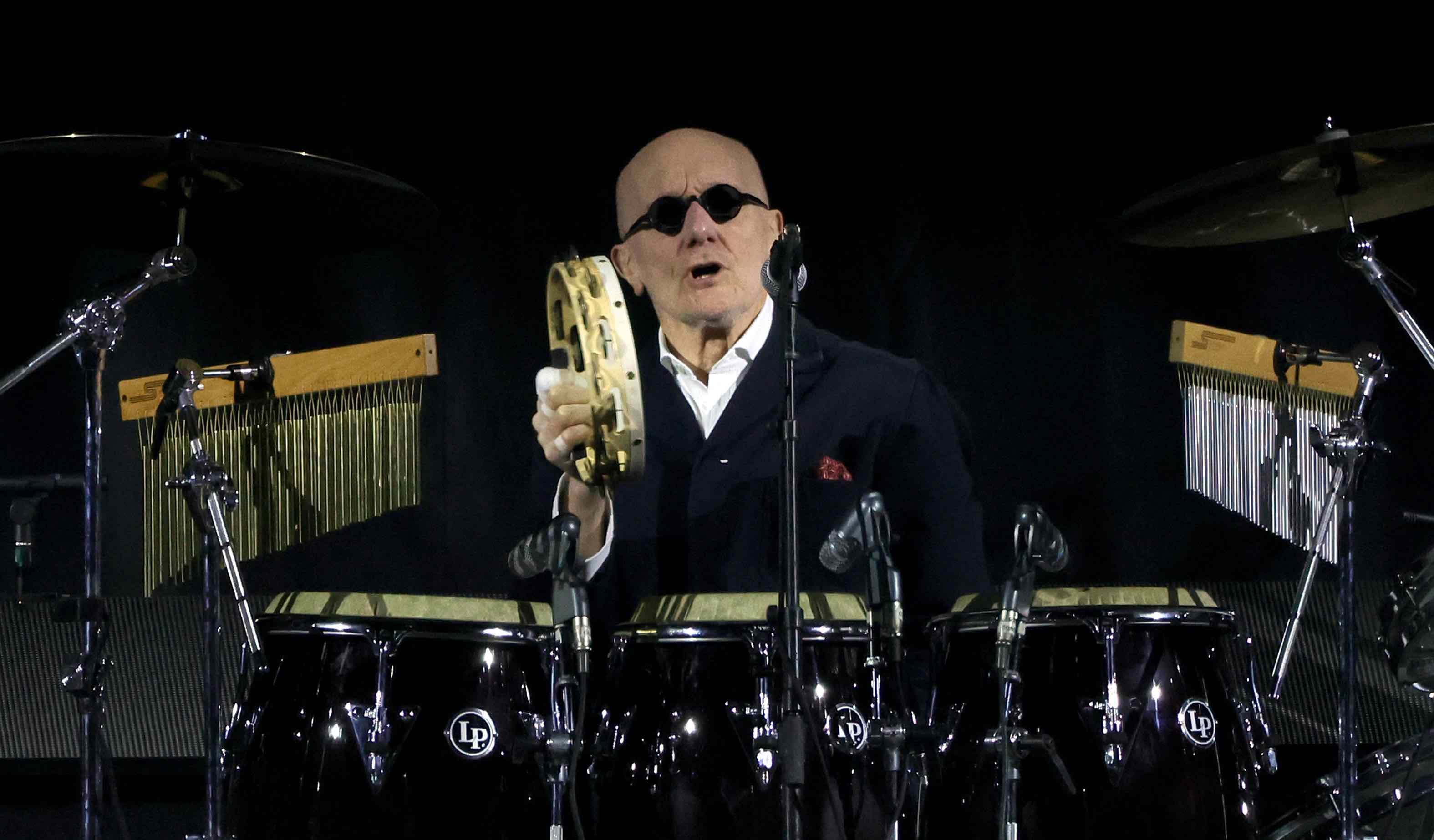
I think there's a perception that a lot of artists engage with touring out of promotional necessity, so do you enjoy touring?
"I love touring. Every time I open the fridge door I do 10 minutes when that light comes on! I've always thought that I would want to be like Duke Ellington. Duke died in a hotel room, waiting to go on stage.
"I loved seeing the world. It was a ticket to these wonderful countries, to play to different cultures, to understand how music affects people in a different way with different languages, and to make a bridge into those cultures.
"Sir Elton is so much more of an ambassador than many ambassadors. He speaks loudly for such wonderful, good things and culture. And the fact that we should all be joining hands on this planet rather than boxing each other's ears."
How did that collaboration work? Did you plan out the whole show?
"What was such a privilege for me was that he gave me the trust and the respect that I knew what he wanted to do. He just said, ‘You do your thing. I trust you completely musically and theatrically.’ And when there are just two people on stage, it’s theatre. You have to choreograph it. You have to move with each other. You have to be in sync in a way that is very theatrical.
"Sir Elton allowed me the freedom to choose the instruments, make my arrangements of his songs and come in and out of the light, which I always like to do. I just like to leave a memory of what they saw, but not of me.
"When we were in Vegas doing the Million Dollar Piano show I was ‘living above the shop.’ I lived at Caesars Palace. So after the show I’d walk ‘home’ through the gambling halls and enter the lift to the hotel.
"And it would be packed with excited people who’d just been to the show. And I'd walk in the lift and stand at the back and they'd be talking about the show and talking about me and not know that I'm right there.
"And they’d talk about the imagery and the music, and I’d think, ‘Job done’. It's not about me. It's about what I left behind that excited them and entertained them. Percussion is colour but it’s also punctuation. It’s the full stop. It’s the exclamation mark. It's the question mark, even."
One of the comments I saw on a video of you and Sir Elton ‘Live In Moscow’ read “Ray Cooper: All the band you need,” which I thought summed up what you do nicely. A great compliment.
"I've not heard that! At least it wasn’t ‘Ray Cooper: All the bands you wish you’d never had!’"
I was remembering Sir Elton's Royal Variety Performance in 2015, which you were part of. Despite wanting a low profile I think you passed into mainstream consciousness that night. They had you high on a drum riser and the camera just kept going to you. And all the talk the next day was ‘Who was that guy on the tambourine?’ Do you remember that at all?
"I do remember that show… and there wasn't any room for me! No, seriously. That was the problem. So they stuck me on a flightcase. And we did Tiny Dancer, which is such a wonderful song – so balletic in every way.
"I'm so happy you said that because it's all about the movement and the dance that I did with the tambourine. It sounds so silly. It's such a small instrument, but it's so significant. It's such a wonderful instrument and you can make it dance.
"It’s such a joy for me to play and make music. It's such a joy physically. I feel at my best when I'm on a stage playing music. And I want to impart that to the audience and hold hands with them and say, ‘We can all do this. We can all enjoy these moments together.’"
I was looking back on Twitter and after the show the ITV Twitter account tweeted: “What a night! But can we just take a moment to applaud Sir Elton John's tambourine player? Bravo!” I thought that was brilliant.
"Well, I didn't know any of this. You're very kind. Thank you so much!"
Taking it right back for a moment, how did you first hook up with Sir Elton back in the day?
"I've probably known him longer than anybody because we were session musicians together. When Sir Elton was singing background, singing and playing piano, I would turn up and look in the glass booth – we separated the singers and backing vocalists from the bangs and crashes and whatever – and see who was there.
"And later I remember getting asked to do a session with Elton John, and I didn't know who he was. I think it was for Dick James or something, and there he was. And I was: “Wow, OK, you're Elton now…” Then I became aware of his extraordinary rise so quickly on the American side when his [eponymous] ‘black album’ came out.
"I was still busily working in the session world, and I was in a band called Blue Mink, which was actually the band that played a lot of the early Elton John records. They were great session musicians like Herbie Flowers on bass, Barry Morgan on drums, and then one day I got a phone call from Elton's office saying Elton would like to talk to you.
"And he said, 'Why don't you join me? I want you to join my band.' But I couldn’t picture myself with them. He's got a rock and roll band and I'm sort of an old jazzer… I couldn’t see how it would work. So I said, 'The only way this is going to work is if I just come on stage and do it with you.' And he said, 'Well, we're in Glasgow tomorrow.'
"So I arrived in Glasgow and we played the show and my hands were split because I've never played that loud before! My hands were bleeding and everything else. He looked at me and I had a big smile on my face.
"He said, 'OK, you’re on.' And that was it. I saw the world and made albums and tours and it was just wonderful."
I can imagine Elton being quite the demanding boss.
"He's not demanding. He is very deeply respectful. And he handpicks his musicians because he has respect for what they do and he wants them to join him. He wants those elements to join his music.
"And he’s very deeply respectful of what you do on his records. He very rarely says, 'Oh, you must do this,' or, 'I want this.' He listens and gives a thumb up or he’ll say. 'Well, let's try something else.' He's very diplomatic and very good with musicians because that's where he comes from."
So you've never fallen foul of that famous temper?
"No. I have to say it's always made me very sad when he’s walked off stage or whatever, and I've been there for that. We all have issues and one must embrace, as a friend, those elements of each other and try and help.
"But I've never felt insulted or done down. Ever. It's been a wonderful ride and a wonderful time, and I shall be forever grateful for him. I just wish it would go on a bit longer!"
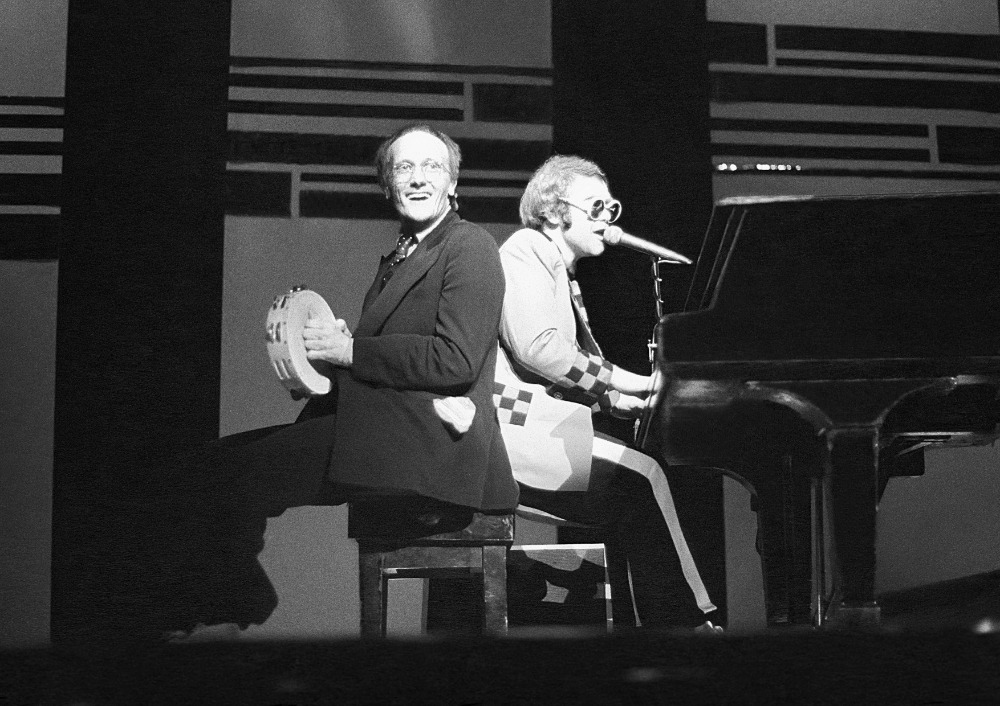
Going all the way back, what made you get started with percussion? Were you ever a drummer?
"I was a pianist, believe it or not. Classically trained, I went to the Royal Academy of Music. But I realised that there were just so many wonderful musicians… it's not a competition, music. I'm always very perturbed when people say it is: ‘It's like sports.’ No, it’s not. We're not beating anybody. We're, in fact, doing the contrary. We're joining people together with love. We're not out to win.
"So there I was meeting such great piano players and I thought, ‘OK, piano has given me the roots of music. It taught me to read. What else is there?’ So I took up woodwind instruments. And that was a joy. It was so beautiful to literally breathe life into an instrument and make it sound lovely.
"And when I was young, from the East End, from a very, very poor background and a single parent, I had these precocious ideas about being a composer and a conductor. And I thought it would be a good idea if I had an idea of what it would be like to play all the instruments that I'm going to write for. And after meeting all these other great musicians, I thought, 'So what’s nobody playing?' And of course, there were wonderful percussion players of the symphony world. And I was taught by one of the masters, James Blades. And I wouldn't be talking to you today if it wasn't for Jeremy Montague, who was a wonderful percussion player and my mentor.
"So I was playing orchestral percussion and trying to earn a living for my dear mother while I was still a student – which I was not allowed to do. I started doing some jazz work, because I loved jazz and I was very lucky to work with Johnny Dankworth and Cleo Lane in the old days, and it was those jazz musicians that brought me into the studio world.
"And then I started to see that there weren’t too many Latin percussion players. Barry Morgan, the Blue Mink drummer, and Sir Elton’s drummer at one point, was a Latin player and I'll be forever grateful to that dear man, because he said, 'You know, I think you can do this.' So that added another arm to my classical percussion.
"Suddenly, I was learning whilst working. Earn while you learn, as they say! I took it on and gave it a different twist to bring it into the rock and roll that was going on at that point. And the rest is history."
What is it that you think that you bring to the art? Why did all the big names pick you?
"It's the joy that I feel and I want to give. The fact that I'm the luckiest person on earth to be in that position, standing on that stage with Sir Elton, with Eric Clapton… With all sorts of extraordinary people that I've been lucky enough to play with. Expressing the joy of that has always been very important to me.
"And the space between the notes. By striking the tambourine and holding my hand up, I express to the audience a space, which is a breath of air for them but also the excitement of what's coming next. The space between the notes is as important as those notes, and I physically demonstrate that space. And I physically demonstrate full stop. The punctuation. The colour."
It’s not just the music. It’s the performance.
"Exactly. I try in my own small way to bring a bit of theatre. Moving in and out of light and shade. To come in, suggest something, and then lead the audience. That's what I've been trying to do and that's what I think people like.
"We are the safety net for all the lovely, wonderful drummers that I've been privileged to work with. Those wonderful high flyers. They can fly off, knowing that there's a safety net underneath!"
Are there any sessions that have been particularly memorable? Any song that you've really been proud to be part of?
"There's so many in the portfolio of Elton John. And the joy of playing with Eric Clapton and being on the stage and playing with Joni Mitchell in Japan which was extraordinary. It goes on and on. I played with Ray Charles at the Montreal Jazz Festival. I played with Quincy Jones. I’ve just been extraordinarily lucky in my career. Stanley Clark, all these great players, John McLaughlin…"
And what a great band you played in for Eric Clapton…
"It was a fantastic band and it was a fantastic time and it lasted for about three, four years. Mark Knopfler was in that band - Sir Elton was in that band for one tour. He wanted to play and he came on and played electric piano. It was incredible.
"Sting came up a few times, but Mark was on a whole tour of Japan and Eric is a wonderful, wonderful band leader.
"Like Sir Elton, he's such an inspiration when he's playing and he's a wonderful man to be around. There was a great camaraderie in that band. Steve Ferrone, Nathan East, Greg Phillinganes. On many of those shows, I would stand there and go, 'Wow, OK, we're doing it that way tonight.' And that was great. Let's go for it! And he would know I would click into it and he wouldn't have to give me a 1, 2, 3, 4 or whatever. I would be there. And that was a great privilege and an honour."
And his Unplugged, which you’re part of, was such a landmark.
"It was wonderful persuading him to do Unplugged because really, at that point, Eric didn't really know why he was going to do it, you know? But then once we started rehearsing it and everybody was so enthusiastic… It ended up being one of the biggest albums. And a beautiful album, coming so close after such tragic events in his life. I think it was cathartic, in a way."
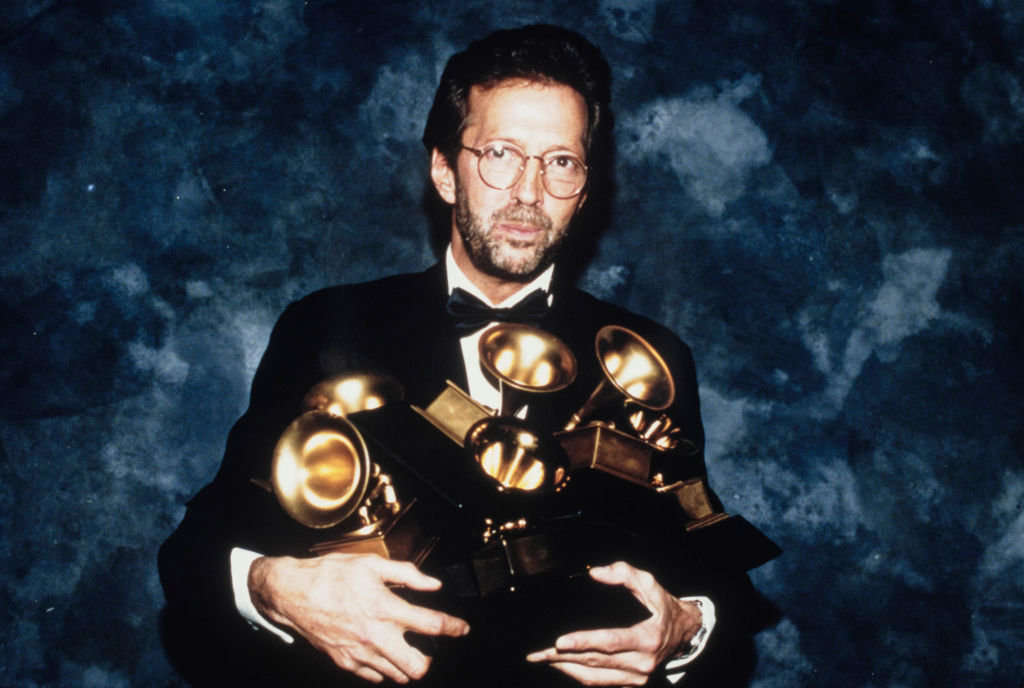
They've become the definitive version of Eric's songs for a lot of people.
"Yes. Layla, the ‘club version’ as I used to call it. Bringing it full circle - that’s what I think the original Rainbow concert did for Elton. A chance to really look at a portfolio and say, ‘Well, maybe I can sing this in a different way or maybe I can do it this or maybe I can do that.’
"And he did. He was completely free. There was no worry about having to explain arrangements to the band. He was just free to do it."
You mentioned earlier about having ‘more instruments than anybody else’. I was wondering if you have your version of the ‘classic Les Paul’? Like David Gilmour's got his ‘black Strat’? Is the gear important to you?
"Well, when I pick a stick up I know if I’ve got it in the wrong hand. They're identical… Except they're not [laughs].
"For me, they're not! There's a feel about them that I get. I want to know what this stick, this one stick in my right hand and this other stick in my left, will do for me. What it will do with me. That's what I love about those instruments.
"I was taught to lap your own drumheads with real skins. You had to know how to do that. You took over the family bathroom and filled the bath with water and put the skin in. I learned all those tricks – learning how to make or repair the instruments and look out for good ones.
"When I found a good tambourine, which was quite difficult in the early days, I just used to buy as many of them as I could. And treasure them. I still do that with sticks today."
So you’ve got quite a collection?
"I did an album for a wonderful woman singer and she asked me, 'Do you have any wind chimes?' And I rummaged through my box, with all these tinklings going on. And I said, 'Do you want glass or brass?' And she said, 'What do you mean?' And I said, 'Well, I've got glass… and I've got brass.' And we went with the glass.
"What we really need to do is have a big collective group of musicians from around the world playing together and exchanging their instruments because this is how new instruments will evolve. We really haven't had a new acoustic instrument since Adolphe Sax invented the saxophone.
"After that, things became electronic and, of course, there's been a huge raft of instruments in that field. But I like the idea of people getting together as they used to when they were travelling. Different cultures discovering each other and saying, 'Oh, you've got six strings on that.” And new things being born.
"I'm sure that that's how new dance forms came about and new instruments developed. Because people were sharing.
"And the new equipment – drum equipment. It's all getting stronger, more sturdy, and therefore more reliable. And that's a wonderful thing that's happened. Great companies like DW Drums and Yamaha, of course. Everything is of the highest quality. And that's an innovation in itself. That's moving the game up.
"And it's so important that we bring music back into education. Unfortunately, I think in this country, it's sort of slipped out of the curriculum. It's so healthy and so important for children to make music and to give them great instruments to play on.:
About the advent of electronics and drum machines in the '80s: as a percussionist, did you ever feel ‘under threat’?
"Only under threat of my own stupidity by not being able to work one! Literally, I can't use a drum machine. I don't know how.
"I have to have a stick at the end of my hand. If I use my fingers… It's not the same.
"But I do admire the great drummers who are wonderful electronic drummers too and can program. I mean, John Mahone, the percussion player, is a wonderful programmer. I haven't got a clue how to do that stuff."
So what’s coming up for you, following this Rainbow album release? What’s next?
"I'm on it until the day I drop. I just hope the phone keeps ringing because I never want to stop playing. I'm so grateful that Sir Elton has these charity shows that he does and I'm very privileged that I get invited to be a part of those.
"I'm like a hunting dog. I'm just waiting under the table waiting for my master to take me out for the hunt!
"And it's a privilege to talk to people that are as enthusiastic as you are about music, because music is under attack. It's been said that music is the liquid architecture of our emotions, and that's really what it is.
"I’m shocked by AI. I'm horrified by it in many ways. The way it's been used. Maybe it's got its good sides, but culture and live music is the only way we can keep it from going into that box.
"Because music is an expression that only humans can do. And that will always move people. It will make them cry. It will make them laugh. And we must never, ever lose that."
Elton John - Live from the Rainbow Theatre with Ray Cooper is available now via UMR.
Daniel Griffiths is a veteran journalist who has worked on some of the biggest entertainment, tech and home brands in the world. He's interviewed countless big names, and covered countless new releases in the fields of music, videogames, movies, tech, gadgets, home improvement, self build, interiors and garden design. He’s the ex-Editor of Future Music and ex-Group Editor-in-Chief of Electronic Musician, Guitarist, Guitar World, Computer Music and more. He renovates property and writes for MusicRadar.com.
You must confirm your public display name before commenting
Please logout and then login again, you will then be prompted to enter your display name.

